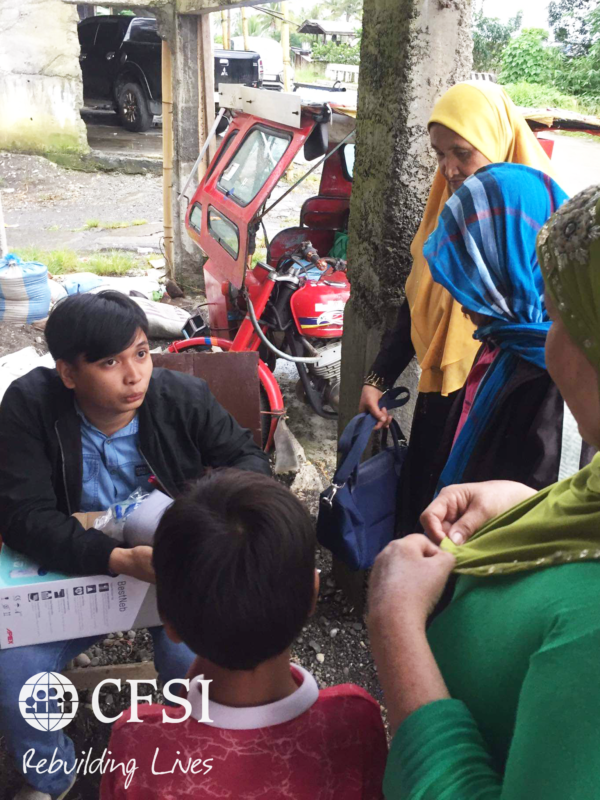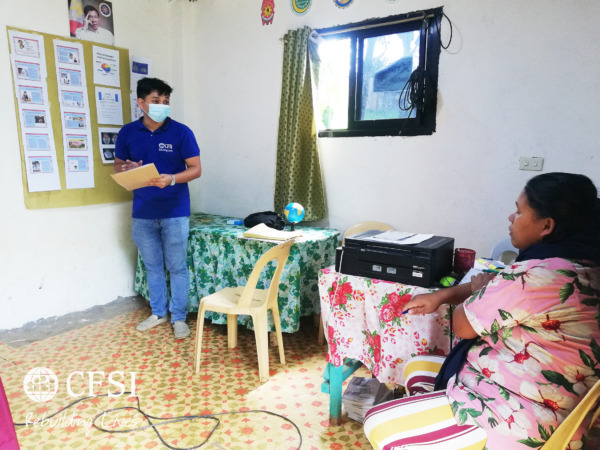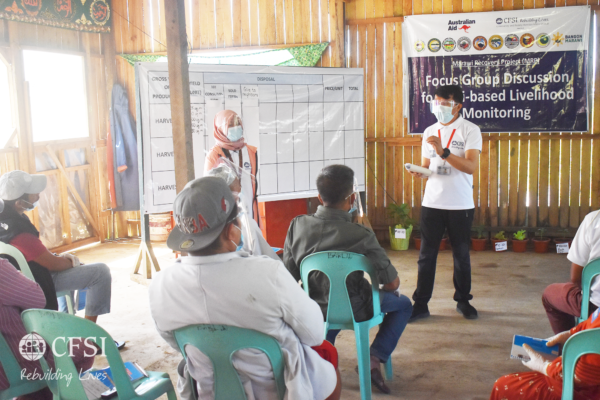Story contributed to Marawi Aken, a community-initiated newspaper by and for the people of Marawi City and Lanao del Sur. The article can be found on page nine of the publication.
Humanitarians go to places affected by calamity and conflict to alleviate the suffering of the distressed people. But in the process of rebuilding the lives of the displaced population, there is also something in the humanitarian workers that are being changed for the better.
The Community and Family Services International (CFSI) is an international humanitarian organization committed to peace and social development, with a particular interest in the psychosocial dimension. Based in the Philippines, the purpose of CFSI is rebuilding lives.
CFSI entered into a project partnership with the Australian Government to give aid to the people of Mindanao, Southern Philippines through the Marawi Recovery Project (MRP). The project aims to promote the protection, psychosocial, and economic recovery of at least 6,500 households (32,500 persons) affected by the Marawi crisis, thereby enabling an improved quality of life and greater prospects for peace.
In addition to Marawi City, MRP is also implemented in its nearby municipalities of Ditsaan-Ramain, Marantao, Piagapo, Butig, Lumbayanague, and Masiu in Lanao del Sur province.
Campaigns for mental health
Abdul Azis Ontawar, a registered psychometrician and an advocate of mental health and psychosocial well-being, is a field assistant under the psychosocial support component of MRP.
He works with people with mental health issues, providing support and information about their condition.
“I’m happy with this work and it’s very fulfilling. Alam mo yung nakatulong ka sa isang tao. Nabibigyan mo ng pag asa, at nagiging inspirasyon ka,” he said.
(I’m happy with this work. It’s very fulfilling to help, give hope, and be an inspiration to other people.)

Abdul Azis Ontawar (leftmost), CFSI field assistant and the MRP’s resident psychometrician handling mental health cases in Lanao del Sur.
Abdul Azis shared that he is currently handling about 40 to 50 cases. Most of these were undiagnosed with posttraumatic stress disorder (PTSD), psychosis, schizophrenia, autism, auditory hallucinations, and dementia.
“At first, maninibago ka. Isa pa doon ang matatakot ka, kasi unusual ang behavior na pinapakita ng client,” he said.
(I got scared at first. The clients exude unusual behavior most of the time.)
He added that some of the clients used to be isolated in the house or even tethered because they were throwing uncontrollable tantrums and other aggressive behaviors.
Generally, Filipino families are not yet open to dealing with mental health issues. Abdul Azis added that families tend to be in denial of the existence of mental illness in their members, thereby depriving the affected family member of due treatment.
“Mahirap dahil limited and services na kayang maibigay sa kanila (mental health clients). Limited ang mental health professionals sa Marawi, kaya when it comes to referral, nahihirapan tayo kasi kailangan pang i-refer sa Iligan or Marawi,” he added.
(We can only offer limited services to our mental health clients. It’s also a challenge to refer them to other mental health professionals because only a few are practicing that profession in the area. Most are located in a different city like in Iligan.)
Linking to proper treatment and medication
With his involvement in humanitarian work, Abdul Azis realized that there were a lot of mental health cases in Lanao del Sur than what the records state. This inspires him to work further and serve more people in his community.

Part of Abdul Aziz’s work in the psychosocial support component is giving psychoeducation to parents of children with Autism Spectrum Disorder.
Among the strategies of Abdul Azis and his team is to build rapport with the clients as well as with its family members and caretakers. That way, it would be easier to encourage everyone to be on board in dealing with mental health illness and provide proper care to the affected family member.
They also refer cases to the rural health units (RHUs) and to the Lanao del Sur Integrated Provincial Health Office (IPHO) to prescribe the clients on proper medicines such as antipsychotic drugs. These medicines are delivered to the very homes of the clients by the nurses and doctors of the two offices.
With these strategies, Abdul Azis observed improvements in their clients during their weekly home visits.
“Nakakausap na sila ng maayos, intact na sila sa reality, [at] aware na sila sa paligid nila at sa mga nakakasalamuha nila,” Abdul Azis said.
(They can converse better. They are also becoming aware of their environment and the people around them.)
Despite the pandemic
The COVID-19 pandemic caused the team to have fewer home visits because of movement restrictions. There was also a time when some Psychosocial Support (PSS) interventions that had to be done in a group were postponed.
However, during the Enhanced Community Quarantine (ECQ) in Lanao del Sur, efforts to monitor the well-being of their clients did not stop. Through field-based staff and the use of mobile phones for calls and text messaging, the team was able to check on MRP project participants and orient them on the pandemic.
“[Psychosocial support interventions] are not ‘one shot, one deal’ activities. It must be continuous until makita na may improvement [sa clients]. We make sure that our clients are in a good condition,” Abdul Azis said.
(Psychosocial support interventions are not “one shot, one deal” activities. It must be continuous until improvements are observed. We make sure that our clients are in good condition.)
An IDP helping other IDPs
Yukie Dangcal, another humanitarian worker and a community organizer of CFSI, works with farmer households, solo parents, senior citizens, pregnant and lactating women, and other vulnerable persons in the Municipality of Ditsaan-Ramain.
Like most of the clients, Yukie also had to flee from his home when the Marawi Siege erupted. Along with his family, they were able to bring nothing but themselves when they escaped the City.
“Hindi namin alam kung saan kami magsisimula,” Yukie said.
(We didn’t know how to build our lives again.)
About a year after the siege, he was engaged to work under CFSI’s MRP in service of other internally displaced persons (IDPs).
Now, he does home visits to MRP project participants, monitors their situation, and assists them in processing requirements to avail government subsidies and services.
Yukie said that helping his fellow IDPs is also helping him to rise above the tragedies of the past.

Yusoph “Yukie” Dangcal, CFSI community organizer under MRP, who is working with vulnerable persons in the Municipality of Ditsaan-Ramain.
He added that he finds joy in seeing the improvements in their clients who used to be isolated at home, cannot walk, or are not able to avail of help or support, among others.
Humanitarians are changed, too
Yukie said that his daily grind involved hiking under the heat of the sun and visiting multiple houses in a day. Nonetheless, every ounce of toil he gives is worth it.
“[Nakakataba] ng puso. Nawawala ang pagod mo kasi nakikita mo [na] ang trabaho mo, may pinatutunguhan. Ang pinakamagandang parte sa trabaho ko ay nakikita ko ang epekto [nito] sa community,” Yukie said.
(It fills my heart with much joy. I’m filled with energy again every time I see the positive effects of my job in the community.)
As for Abdul Azis, his workplace is also not very safe, especially in this time of the pandemic. Still, he continues to serve.
“Nandyan yung pangamba mo kasi hazardous ang trabaho mo. Armed conflict is there. Dagdagan pa ang pandemic as a health hazard,” Abdul Azis said.
Nonetheless, “There’s hope in this world, despite the conflict, at nakakapagbigay ka ng ngiti sa mga natutulungan mo.”
(I’m always worried because of armed conflict and the health hazard of the pandemic. Nonetheless, there’s hope in this world, despite the conflict, as long as you can help shed a smile on the people you are serving.) #

